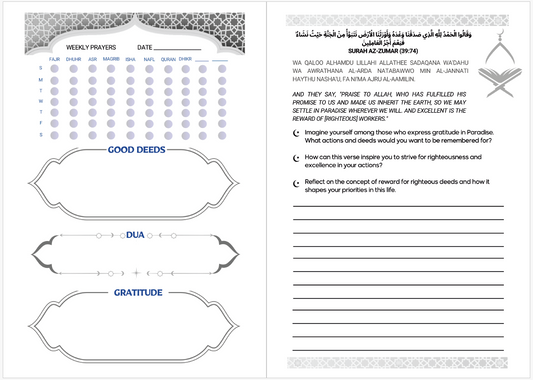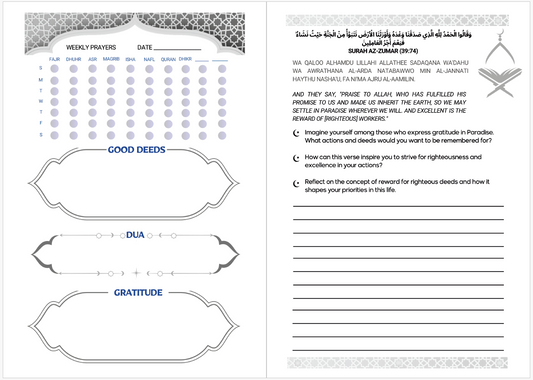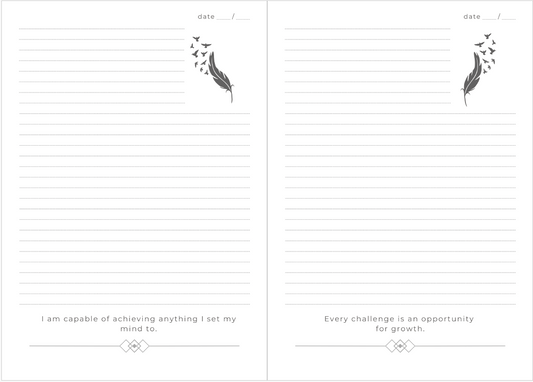Consensus
As a parent, watching your teenager navigate the rollercoaster of adolescence can be heartwarming and, at times, heart-wrenching. It's a journey filled with highs, lows, and countless learning opportunities. Amidst this whirlwind of change, one simple, yet profoundly impactful practice can make all the difference: journaling.
A Safe Harbor in the Storm
Imagine your teen having a safe, private space to express their deepest fears, wildest dreams, and everything in between. That's the sanctuary journaling provides. Studies, like the one by Utley and Garza (2011), reveal that journaling is more than just writing; it's a therapeutic outlet for self-expression, offering teens a haven to explore and understand their emotions.
Cultivating Reflective Thinkers
Journaling doesn't just help teens deal with the present; it prepares them for the future. Reflective thinking is a critical skill in today's fast-paced world. According to Woodbridge and O'Beirne (2017), journaling fosters this skill, enabling teens to develop a deeper understanding of themselves and their place in the world.
Boosting Academic Engagement
The benefits of journaling extend beyond emotional well-being. Blake (2005) points out that journaling enhances academic performance by promoting critical thinking and reflective practice. It connects classroom learning with real-life experiences, making education more meaningful and engaging for teens.
A Pillar of Mental Health
In an era where teen mental health is a pressing concern, journaling emerges as a beacon of hope. The research by Sohal et al. (2022) suggests that journaling can be a valuable tool in managing mental health, offering a low-risk, accessible form of self-care that can make a significant difference in your teen's life.
Building Confidence and Resilience
Lastly, journaling empowers teens with a stronger sense of self. Fritson (2008) found that journaling boosts self-efficacy, helping teens believe in their abilities and take control of their lives. This newfound confidence can inspire them to tackle challenges head-on and persevere through adversity.
The Gift of Journaling
As parents, our deepest wish is for our children to lead happy, fulfilled lives. By encouraging your teen to journal, you're offering them a gift that goes beyond the pages of a notebook. You're giving them a tool for self-discovery, a strategy for academic success, and a practice for mental wellness. So, consider introducing your teen to journaling. It might just be the key to unlocking their full potential.
In this journey of adolescence, where every day is a new chapter, a journal can be the most faithful companion your teen could ask for. It's not just about writing; it's about growing, learning, and thriving. And isn't that what we all want for our children?
Tips for Parents to Support Teenage Journaling:
- Encourage your teenager to journal regularly, but don't force it. Let them do it at their own pace.
- Provide your teenager with a journal that they like and feel comfortable using.
- Create a quiet and private space for your teenager to journal in, free from distractions.
- Be supportive and non-judgmental about what your teenager writes. Remember, the journal is for them, not for you.
- If your teenager expresses distress or needs additional support, consider seeking professional help.
Conclusion:
Journaling can be a powerful tool for teenagers to cope with the challenges they face and improve their mental well-being. By encouraging and supporting your teenager in starting a journaling practice, you can help them develop important skills such as self-reflection and self-awareness, and provide them with a valuable outlet for their emotions. So, parents, take the time to talk to your teenagers about journaling and encourage them to give it a try. You might be surprised at the positive impact it can have on their lives.
Journaling isn't just a pastime—it's a transformative practice with the potential to shape your teenager's future. Amidst the statistics highlighting the prevalence of mental health challenges among adolescents, the importance of equipping them with effective coping mechanisms cannot be overstated. By championing journaling as a tool for self-discovery and resilience, we empower our teenagers to navigate the ups and downs of adolescence with confidence and grace.
Here's to igniting your teenager's potential—one journal entry at a time.
With warm regards,
Pretty Paper Notes
Learn more about our Teen Journal: “Vibes & Vents A Teen’s Moodboard”.
References:
- Utley, A., & Garza, Y. (2011). The therapeutic use of journaling with adolescents. Journal of Creativity in Mental Health, 6(1), 29-41.
- Woodbridge, L. M., & O'Beirne, B. (2017). Counseling Students’ Perceptions of Journaling as a Tool for Developing Reflective Thinking. Reflective Practice, 9(1), 12.
- Blake, T. (2005). Journaling; An Active Learning Technique. International Journal of Nursing Education Scholarship, 2(1).
- Sohal, M., Singh, P., Dhillon, B. S., & Gill, H. (2022). Efficacy of journaling in the management of mental illness: a systematic review and meta-analysis. Family Medicine and Community Health, 10(1).
- Fritson, K. K. (2008). Impact of Journaling on Students' Self-Efficacy and Locus of Control. InSight: A Journal of Scholarly Teaching, 3, 75-83.
These references provide a solid foundation for understanding the multifaceted benefits of journaling for teenagers, from enhancing self-reflection and emotional expression to boosting academic engagement and mental health.









